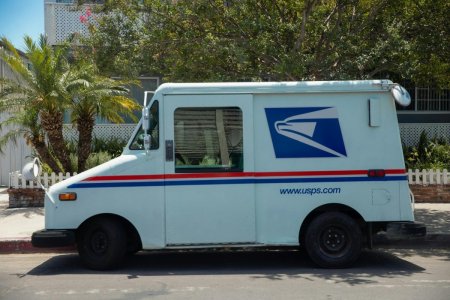USPS leadership change draws attention amid questions about future service
By
Veronica E.
- Replies 2
For many Americans, the United States Postal Service (USPS) is more than just a mail carrier—it’s a daily connection to the things that matter most.
From prescription medications and Social Security checks to monthly bills, handwritten letters, and important legal documents, the USPS plays a critical role in keeping households running smoothly and families in touch.
For older adults, veterans, and individuals with limited mobility, reliable mail service isn’t just convenient—it’s essential.
That’s why a proposed leadership change at the top of the USPS is sparking concern nationwide.
As the agency considers new direction, many are asking whether this shift could impact the affordability, reach, and reliability of the services so many people depend on every day.

Leadership shake-up draws attention
Following the March resignation of Postmaster General Louis DeJoy, the USPS is reportedly preparing to appoint David Steiner as its new leader.
Steiner currently serves on the board of FedEx and is the former CEO of Waste Management.
Some officials have praised the move, citing Steiner’s private-sector experience and suggesting it could bring more efficiency to the Postal Service.
But the decision has drawn sharp criticism from the National Association of Letter Carriers (NALC), which represents nearly 300,000 active and retired postal workers.
In a public statement, the NALC expressed deep concern, saying: “Steiner comes directly from service on FedEx’s board of directors, presenting a clear conflict of interest. His selection isn’t just a conflict of interest—it’s an aggressive step toward handing America’s mail system over to corporate interests.”
Union concerns go beyond competition.
FedEx, one of USPS’s largest competitors, doesn’t serve all areas and often charges higher rates—especially in remote or underserved regions.
Critics fear that a leader with ties to FedEx may push for privatization, something many postal workers and unions oppose.
They’re also wary of Steiner’s past.
While leading Waste Management, he was known for implementing cost-cutting measures that included reducing union power and replacing workers with automation.
The union warns this approach could jeopardize the jobs of nearly 8 million Americans connected to the postal industry.
Adding to the worry is the fact that USPS recently posted a $144 million profit in late 2024, thanks to cooperation between leadership and workers.
Many fear that progress could be reversed under new leadership.
Also read: Shocking USPS price hike: How much more will your summer mail cost you?
Why this matters for everyday Americans
For most people—especially in rural America—the USPS isn’t just convenient, it’s a lifeline.
It’s the only service legally required to deliver to every address in the country.
Private carriers like FedEx and UPS often don’t reach these areas or charge extra when they do.
The NALC put it plainly: “The damage will hit rural communities hardest, where the Postal Service isn’t just a convenience—it’s a lifeline.”
If USPS operations were to shift or scale back in certain areas, potential effects could include:
Also read: Think twice before opening that package—USPS flags major privacy risk
Is this part of a bigger push?
This isn’t the first time USPS has faced privatization discussions.
Some believe parcel delivery could be more efficiently handled by private companies.
But others argue that when profit becomes the sole focus, service to less-profitable areas—and vulnerable populations—tends to decline.
This shake-up comes amid other USPS challenges.
In March, the agency announced plans to reduce its workforce by 10,000 employees.
Louis DeJoy’s resignation also followed reports of conflict over government efficiency goals.
Also read: USPS is rolling out major updates and customers are being urged to prepare
What can you do if you're concerned?
If the USPS plays a role in your daily life—as it does for millions—there are steps you can take:
As the USPS moves forward with potential leadership changes, many are watching closely to see how this could shape the future of mail service in the United States.
While it’s too early to know what impact, if any, these changes will have, staying informed and engaged will help ensure that the needs of all Americans continue to be part of the conversation.
Read next: USPS under fire: Lawmaker blasts mail delivery failures!

Has your mail service changed recently? Do you rely on USPS for medications, correspondence, or small business shipping? We invite you to share your stories, questions, or concerns. Every voice counts—and sharing how the USPS has helped you could support the case for keeping it strong, public, and accessible to all.
From prescription medications and Social Security checks to monthly bills, handwritten letters, and important legal documents, the USPS plays a critical role in keeping households running smoothly and families in touch.
For older adults, veterans, and individuals with limited mobility, reliable mail service isn’t just convenient—it’s essential.
That’s why a proposed leadership change at the top of the USPS is sparking concern nationwide.
As the agency considers new direction, many are asking whether this shift could impact the affordability, reach, and reliability of the services so many people depend on every day.

The United States Postal Service remains a vital part of daily life for millions of Americans, especially in rural and underserved areas. Image Source: Pexels / Ekaterina Belinskaya.
Leadership shake-up draws attention
Following the March resignation of Postmaster General Louis DeJoy, the USPS is reportedly preparing to appoint David Steiner as its new leader.
Steiner currently serves on the board of FedEx and is the former CEO of Waste Management.
Some officials have praised the move, citing Steiner’s private-sector experience and suggesting it could bring more efficiency to the Postal Service.
But the decision has drawn sharp criticism from the National Association of Letter Carriers (NALC), which represents nearly 300,000 active and retired postal workers.
In a public statement, the NALC expressed deep concern, saying: “Steiner comes directly from service on FedEx’s board of directors, presenting a clear conflict of interest. His selection isn’t just a conflict of interest—it’s an aggressive step toward handing America’s mail system over to corporate interests.”
Union concerns go beyond competition.
FedEx, one of USPS’s largest competitors, doesn’t serve all areas and often charges higher rates—especially in remote or underserved regions.
Critics fear that a leader with ties to FedEx may push for privatization, something many postal workers and unions oppose.
They’re also wary of Steiner’s past.
While leading Waste Management, he was known for implementing cost-cutting measures that included reducing union power and replacing workers with automation.
The union warns this approach could jeopardize the jobs of nearly 8 million Americans connected to the postal industry.
Adding to the worry is the fact that USPS recently posted a $144 million profit in late 2024, thanks to cooperation between leadership and workers.
Many fear that progress could be reversed under new leadership.
Also read: Shocking USPS price hike: How much more will your summer mail cost you?
Why this matters for everyday Americans
For most people—especially in rural America—the USPS isn’t just convenient, it’s a lifeline.
It’s the only service legally required to deliver to every address in the country.
Private carriers like FedEx and UPS often don’t reach these areas or charge extra when they do.
The NALC put it plainly: “The damage will hit rural communities hardest, where the Postal Service isn’t just a convenience—it’s a lifeline.”
If USPS operations were to shift or scale back in certain areas, potential effects could include:
- Slight delays in receiving prescriptions or government mail
- Changes to delivery timelines for Social Security checks and other important documents
- Adjustments in mailing costs for some households or small businesses
- Reduced availability of services in more remote or sparsely populated regions
Also read: Think twice before opening that package—USPS flags major privacy risk
Is this part of a bigger push?
This isn’t the first time USPS has faced privatization discussions.
Some believe parcel delivery could be more efficiently handled by private companies.
But others argue that when profit becomes the sole focus, service to less-profitable areas—and vulnerable populations—tends to decline.
This shake-up comes amid other USPS challenges.
In March, the agency announced plans to reduce its workforce by 10,000 employees.
Louis DeJoy’s resignation also followed reports of conflict over government efficiency goals.
Also read: USPS is rolling out major updates and customers are being urged to prepare
What can you do if you're concerned?
If the USPS plays a role in your daily life—as it does for millions—there are steps you can take:
- Stay informed through reliable news outlets and organizations like the NALC
- Reach out to your representatives to voice your support for protecting USPS as a public service
- Share your experience if mail delays or disruptions have affected you or your family
As the USPS moves forward with potential leadership changes, many are watching closely to see how this could shape the future of mail service in the United States.
While it’s too early to know what impact, if any, these changes will have, staying informed and engaged will help ensure that the needs of all Americans continue to be part of the conversation.
Read next: USPS under fire: Lawmaker blasts mail delivery failures!
Key Takeaways
- The USPS is facing criticism over its decision to potentially appoint David Steiner, a FedEx board member and former CEO of Waste Management, as the new Postmaster General.
- Postal unions, particularly the National Association of Letter Carriers (NALC), have strongly condemned the move, arguing that Steiner’s corporate background and ties to a major competitor present a significant conflict of interest.
- The unions fear Steiner’s appointment signals an aggressive step towards privatization, which could endanger vital mail services, especially in rural areas where USPS deliveries are considered a lifeline.
- Despite the White House’s support for the appointment in pursuit of greater efficiency, critics warn that Steiner’s history of union-busting and job reductions threatens millions of postal-industry jobs and could diminish essential mail services for Americans.
Has your mail service changed recently? Do you rely on USPS for medications, correspondence, or small business shipping? We invite you to share your stories, questions, or concerns. Every voice counts—and sharing how the USPS has helped you could support the case for keeping it strong, public, and accessible to all.






